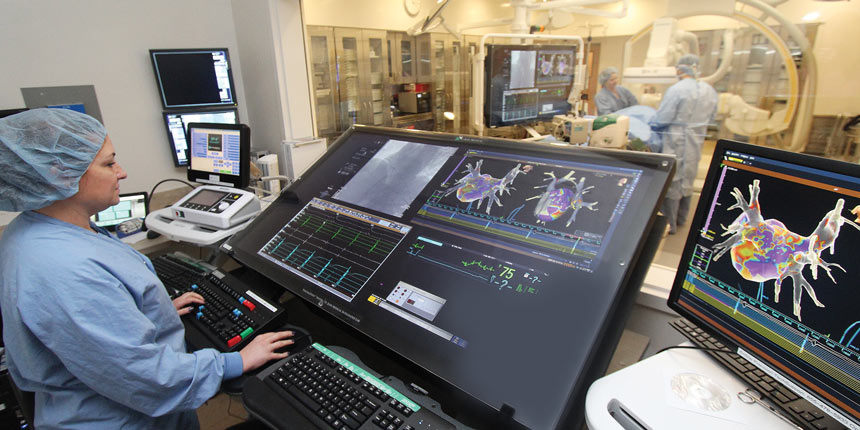Health+
Better, Faster Treatment for Your AFib

New electrophysiology lab offers the most advanced technology available
A $4 million, 3,800-square-foot electrophysiology (EP) lab that offers the latest technology for treating heart arrhythmias is the newest addition to the Harold and Virginia Lash Heart and Vascular Center at Charlton Memorial Hospital.
Opened in February, the lab addresses a critical need in cardiac care for this region. Atrial fibrillation (AFib), the most common form of heart arrhythmia, involves irregular beating of the upper chamber and afflicts as many as 6 million Americans, according to the Centers for Disease Control and Prevention. In 2012, Southcoast’s hospitals discharged more than 700 AFib cases, the second highest number of all the Commonwealth’s health systems, and a number that is expected to rise as the population ages.
Advanced technology
The new lab is dedicated to treating AFib, as well as ventricular tachycardia and atrial tachycardia, conditions characterized by abnormally rapid heart rate. The EP lab is equipped to perform complex procedures that use catheters to destroy the tissue that beats irregularly and restore a regular heart rhythm.
In the lab, physicians use a new mapping system that helps them locate the abnormal electrical signals 10 times faster. The lab is also equipped with more cameras, giving physicians better views of catheters. The result is shorter procedure times and improved accuracy and success.
“With this state-of-the-art lab — that has advanced technology not found in most hospitals — we will be able to continue to provide outstanding outcomes for our patients but with less radiation and greater precision,” says Ramin Davoudi, MD, director of electrophysiology for Southcoast. “Better equipment will not be found anywhere else in this country or, for that matter, the world.”
With two EP labs now at Charlton, patients will experience shorter waits for the cutting-edge treatments available at Southcoast.
More treatment options
In 2015, Southcoast was one of only three hospitals in New England to introduce the Watchman device, which offers an alternative to blood thinners for some AFib patients. The device protects the heart from blood clots and thus the stroke risk associated with arrhythmia.
The previous year, Southcoast was one of the first hospitals in the region to start implanting a defibrillator just under the skin. The Boston Scientific S-ICD System treats patients who are at high risk for sudden cardiac arrest without using leads to the heart, as other implantable defibrillators do.
“There is nothing in the field of cardiac electrophysiology that can be done anywhere in the country that cannot be done here [at Southcoast],” says electrophysiologist Nitesh Sood, MD.
Treating the whole patient
Even with the latest equipment and techniques, AFib can reoccur if underlying causes — such as weight, stress and sleep apnea — are not addressed. Dr. Sood directs the Atrial Fibrillation Wellness Program, where nurse practitioners assess all AFib patients for their quality of life. Patients then can learn to manage sleep apnea, improve their diet and exercise appropriately.
“It has been proven beyond a doubt that mental health and physical health improve patient outcomes,” Dr. Sood says. “It’s more than just performing a surgery and procedure. It’s taking care of the patient as a whole. That’s what makes us different.”
Learn more about the Atrial Fibrillation Wellness Program.
